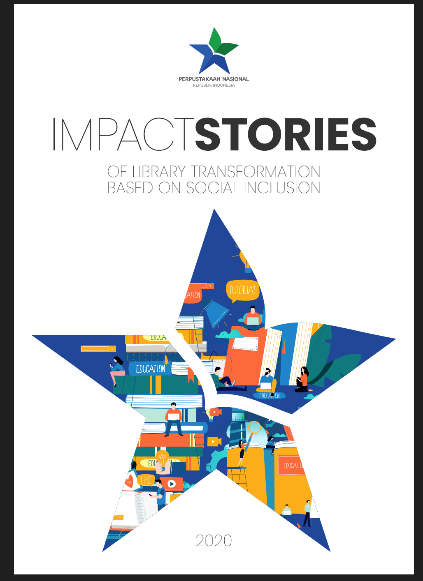Impact Stories of Library Transformation Based On Social Inclusion: A Book Documenting The Stories Of Great People Whose Lives Changed Because Of The Library
24 February 2021

Library Transformation Based on Social Inclusion is one of the Indonesian National Library flagship programs aimed at improving community welfare through libraries empowerment. This program is the First National Priority Program in the library sector and has been running since 2019. It seeks to revitalize public libraries’ functions based on social inclusion. The tagline of the program is “Literacy For Welfare” which means creating a prosperous society from an economic, social, and educational perspective by empowering public libraries in their environment. This program is expected to strengthen public libraries’ role in improving the quality of Indonesia’s human resources by increasing literacy skills which in turn will be useful for increasing community creativity and reducing poverty in access to information. The concept of this program is that of a public library that embraces differences, is participatory, openly friendly, practices equality, removes barriers, provides a comfortable setting, and respects each other.
This program has the following objectives:
- Improving the Quality of Library Services.
- Increasing the Use of Library Services by the Community in accordance with community needs.
- Building Commitment & Stakeholder Support for Sustainable Library Transformation.
These goals are achieved with the following strategies
- Improve the quality of information services in the library, both by enhancing the collection of library materials as well as provision of computers and internet facilities.
- Facilitating activities that are needed by the Community to improve their quality of life.
- Do advocacy to the Regional Leaders, relevant Stakeholders, and the private sector to get policy and budget support for library transformation sustainability.
Through these activities, it is hoped that the role of the National Library of Indonesia in strengthening public libraries will be increasingly felt by the Community.
With a view to promoting this program, the National Library has compiled a book documenting the stories of the people who have benefitted from its implementation. This book is the work of librarians at the National Library of Indonesia and captures inspiring stories like these:
- Faziyah, a young girl from Gayo Lues, Aceh, who did not understand the world of business and had not found her passion in life until she started visiting the library regularly and acquired knowledge to finally manage her own business.
- Suardika, a man from Bali who had lost his job due to the pandemic but was able to find alternative solutions when he visited the Library with his wife. He found a book about the recipe for Indonesian spices that changed his life from being an employee to an entrepreneur.
- Umi, a young librarian from Blora, Java, believes that knowledge should be open to anyone and wherever they are. After undergoing a training program from the Library, this brilliant librarian created and operated a website for the Library where he works.
- Christy from Maluku, though living in a touristic area, had not benefited from the tourism potential due to her foreign language skills limitations. She finally got the opportunity to improve her English language skills through a nearby library. She now has high self-confidence when verbally interacting with international tourists.
- Meanwhile, in West Papua, there is a student named Alvira, the daughter of a fisherman on the coast of Manokwari, who usually goes to school every day. Due to the pandemic, she has to carry out learning activities from home with limited facilities. When Alvira visited the Library, she found that the Library could provide the necessary facilities to fulfil her strong desire to study despite her limitations.
There are many other inspirational stories in this book that reveal how the quality of life of the community can be improved by upgrading the quality of library services. These are just a few of the stories we can document. Out there all over Indonesia, of course, there are more and more people whose lives have changed for the better after benefiting from visiting and using libraries.
The pandemic has changed many things, and we, including libraries, must be adaptive. Libraries can adapt by tailoring its services and undertaking service innovation. Libraries also help people adapt to conditions. Many libraries continue to organize activities to cater to community needs with the safeguard of health protocols. It is an opportunity for libraries to contribute to society during this pandemic. Hopefully, this book can be an inspiration in implementing Library Transformation Based On Social Inclusion anywhere.